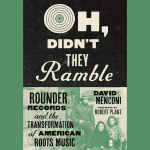Book Review: Ryan Adams: Losering, A Story of Whiskeytown by David Menconi
David Menconi’s biography of Ryan Adams is a fun, quick read for any fan of alt-country. Menconi draws on his own recollections and notes, interviews with Adams done prior to 2001, interviews of key players from the early days (many of which were done in 2011), and internet postings of Adams and others to chronicle the career (so far) of Ryan Adams, the singer-songwriter from Jacksonville, North Carolina by way of Raleigh. For much of the book, Menconi focuses on the Ryan Adams he knows best, the younger Ryan Adams of Whiskeytown (and other bands of lesser longevity, including Patty Duke Syndrome).
Menconi carefully, even lovingly, dissects the Whiskeytown records, particularly the first two, which were released during the time he was regularly in touch with Adams (for reasons that are not completely clear, they haven’t spoken in more than a decade). The interpretation of Strangers Almanac (pages 89-97 of the book) reads like a love poem to Adams and his talented but dysfunctional band, and to Raleigh as well. These pages, and others in the book, are first-rate music journalism from the longtime music critic for the Raleigh News & Observer.
Even after Heatbreaker (which Menconi loved) and Gold (which Menconi didn’t) and after losing touch with Adams, Menconi remained a patient listener and fan. Losering faithfully recounts all of the records through 2011’s Ashes & Fire and includes a helpful “Selected Discography” at the end. Menconi even tries to make some sense out of 2006’s Cardinal Jukebox, an internet dump of hundreds of songs, sign and symbol of Adams’s inability to not be creative and his lack of any real filter. Menconi quotes a Spin magazine column that summed up the situation at that time: “‘These days, it takes almost as much effort to be a Ryan Adams fan as it does to be Ryan Adams. … Every time you hear a new Ryan Adams song, an angel updates his blog.'”
Menconi’s dedication to the music of Ryan Adams is really what sets the book apart – that, and the solid writing. But that won’t sell the book. What will sell the book will be the dirt, all the stories about Adams’s escapades as a bad boy, rock star wannabe turning into an actual bad boy rock star. Even before he was big in Raleigh, Adams had star quality, self absorption and knack for ruining an evening that made him hard to turn away from and difficult to deal with. Add a bit of fame and the right drugs and he was off the chart. Like June 1997 in East Lansing, Michigan, hometown of then manager Jenni Sperandeo, when Adams decided to throw a hissy fit, ostensibly to protest some bar patrons paying too much attention to sports on television. By the time the night is over, he’s on top of the Whiskeytown van throwing cans of beer and being pelted by tomatoes. Sperandeo says Adams threw the show on purpose. “‘Somewhere I have pictures from before the show. It was one of those excessive eyeliner nights for Ryan, who was completely wasted.'”
There are other notable anecdotes and some great quotes in the book. One quote I particularly liked is by Whiskeytown’s frustrated road manager, Thomas O’Keefe. “‘Do you have any idea how lucky you are, that people come to hear these songs you wrote on a bar napkin?'” In a too-revealing anecdote about the intentionality of some of Adams’s misconduct, there’s a story from a Whiskeytown tour. The band members are drinking at the motel pool with members of their fronting act, Red Star Belgrade. Everything is fine until a record guy pulls up in a limo. Adams goes into “‘Keith Richards mode'” and eventually throws a pool chair in the pool. Then, after the record guy leaves, Adams retrieves the chair, puts it back where it belongs, and goes to sleep. There are drug use anecdotes as well. Once Adams is revived on the tour bus by paramedics, who ask him what year it is to determine his orientation. O’Keefe again: “‘If you know Ryan, that’s not really a fair question.'” Even the drug use, as bad as it apparently got, didn’t really scare the Adams posse all that much, at least not Sperandeo. She is credited with what may be the best quote of the book. “‘Anybody who spends his own money to have his teeth capped is not gonna kill themselves.'”
I’m guessing that Ryan Adams won’t like this book. Who would like a tell all written about them, quoting folks who know every detail of some of their most embarrassing moments? Or have someone compile their worst internet posts, showing them to be, or at least to have been, capable of great outbursts of narcissistic nonsense? The book makes a convincing case that Adams is pretty thin skinned, and if that’s true, this one will get to him. I’m also guessing that hard-core Adams fans will find fault with Menconi’s take on their hero and claim that the book is way too focused on Adams’s shenanigans. But anyone who writes this book off because of the bad anecdotes is missing Menconi’s point. He sees Adams as a worthwhile subject for biography because beneath the bad boy rock star veneer of the early days, there was (and is) something very special about him. As an example, Menconi quotes Ed Bumgardner (Winston-Salem Journal music critic) on a Whiskeytown show where Adams’s antics were so bad that the band and most of the patrons left. “‘Then Ryan picks up an acoustic guitar and plays one of the most beautiful forty-minute sets I’ve ever heard. No band, just him.'” Yeah, he’s an enigma wrapped in a series of bad hairdos and a drama queen to boot, but he’s also very, very gifted. If you think about it, he’s hardly the first of that type.
Menconi closes the book with the suggestion that the current day, Mandy Moore-married Adams might have it together, concluding that Ashes & Fire is “thoughtful and mature enough to make a longtime listener think that maybe, just maybe, the kid was growing up at long last.” As a long-time listener myself, I reached the same conclusion (my review is here). Then Menconi recounts his last anecdote of the book, a confrontation with Neil Finn during a BBC taping in 2011, which prompted Janis Ian (also involved in the incident) to write on her website:
I had always, always coasted on my talent, and I was finally discovering that to be a great artist–or even to strive to be a great artist–required much, much more. Ryan is going to have to figure that out for himself, and I don’t envy the fall.
Then Menconi ends the book with an email exchange with Adams from Christmas, 2007. You’ll have to read that for yourself, but it seems to sum up why Menconi wrote this book in the first place: Once a fan, always a fan.
[Losering is published by University of Texas Press and is part of the American Music Series. David Menconi was a contributing editor to the print version of No Depression back in the day.]
Mando Lines is on Twitter @mando_lines.




